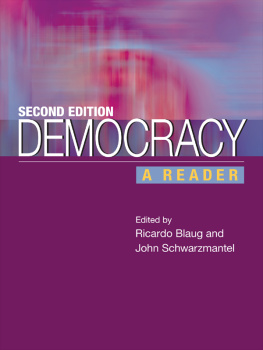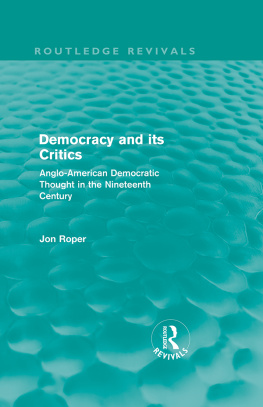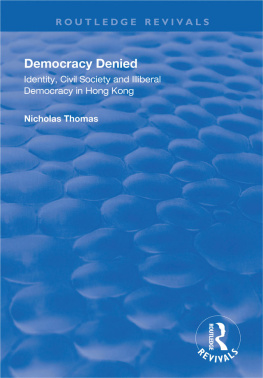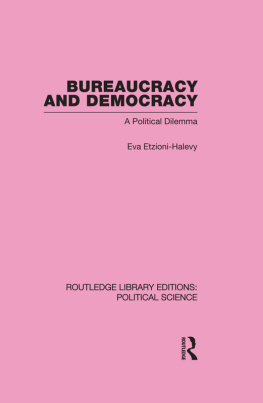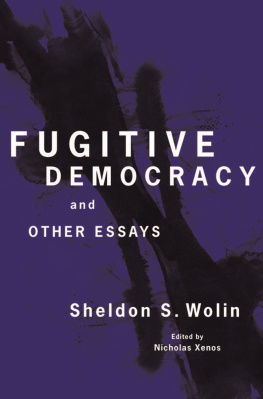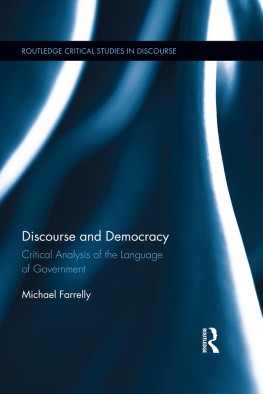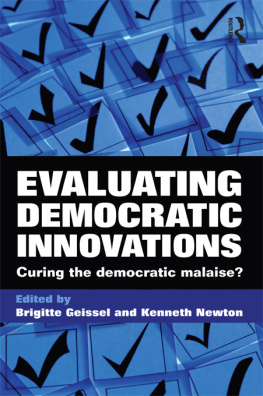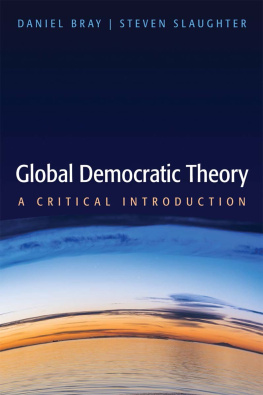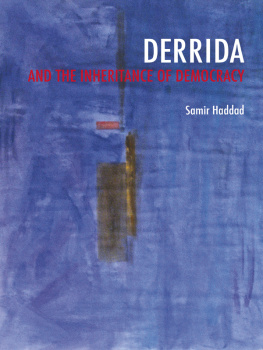Table of Contents
Democracy
DEMOCRACY: A READER
Second Edition
Edited by
Ricardo Blaug and John Schwarzmantel
Columbia University Press
New York
Columbia University Press
Publishers Since 1893
New York Chichester, West Sussex
cup.columbia.edu
First published in the UK by Edinburgh University Press
Copyright 2016 Ricardo Blaug and John Schwarzmantel
Previously published articles or materials reproduced by permission of the copyright holder.
All rights reserved
E-ISBN 978-0-231-53950-0
Library of Congress Control Number: 2016932012
A Columbia University Press E-book.
CUP would be pleased to hear about your reading experience with this e-book at .
Cover design: Michael Chatfield and Stuart Dalziel
CONTENTS
Presenting a new edition of this Reader on Democracy, some fifteen years after its first appearance in 2000 at the beginning of the new millennium, offers the occasion for reflection on the fortunes of the democratic idea, in theory and practice, since the initial publication. New challenges to the democratic ideal have emerged, and so too have new forms of democratic politics. Such developments call for a somewhat revised set of readings to reflect the transformations in world politics and their implications for democracy, and we have tried to adjust our selection accordingly. The main changes made to this new edition of the Democracy Reader relate to the selection of material in The early years of the new century held out the hope for the global advance of democracy and liberalisation, in the wake of the demise of single-party Communist regimes and of the end of authoritarian regimes in Europe (Spain, Portugal, and Greece). Such expectations were bolstered by the growing strength of what came to be the European Union with its laying down of democratic criteria for admission into the EU and the consolidation of democratic rules and regulations on a supra-national basis. There also were considerable hopes invested in the process of democratisation worldwide in developing countries, and in the idea that with the ending of the Cold War a democratic peace bonus would aid the worldwide acceptance of democratic norms and the installation of democratic institutions.
of this Reader. Those three phenomena can be given the labels of neo-liberalism (or the dominance of the market on a global level); the accelerated pace of globalisation, helped by the greater sophistication of the Internet and the enhanced flow of economic exchanges across the borders of the nation-state; and the greater salience of religion and conflicts over cultural and religious identity, often erupting in violence and concomitant attempts by the holders of state power to seek to contain the threat of terrorism, with the danger that such attempts could erode those democratic rights which, as many of our selections in the earlier parts of this Reader emphasise, are central values of democratic politics.
In many ways these three issues (dominance of the market, globalisation, religion and violence) are all intertwined, and the changes we have made to our final section seek to reflect this. We have added to the section on The Market (), where the extracts dealing with deliberative democracy both complement and also contrast with the extracts dealing with the Internet and its contribution, positive and negative, to democratic dialogue.
) has been revised from the first edition, with new extracts, and this section is designed as a complement to the section on Cosmopolitan Democracy. The extracts on nationalism illustrate further the debate on whether nationalism and the nation-state still constitute a fruitful framework for democratic politics, or whether, as proponents of cosmopolitan democracy maintain, the increased globalisation of politics has diminished the significance of the nation-state as the unit through which democratic politics could be realised. If that is the case, then new post-national political structures are required to achieve control of the global spread of unaccountable economic forces which have escaped any effective democratic control through the nation-state and its institutions.
Finally, we have two new sections which seek to pick up some of the salient themes of post-9/11 politics and the implications for democracy, under the headings of Religion and Democracy and Violence. The first of these sections () attempts to offer a selection of views on whether violence, in many cases stimulated by attempts at ethnic cleansing or the dominance of ethnos over demos, has come to undermine the process of democratic advance. This section also seeks to shed some light on the broad question of whether the new global society which has developed in the twenty-first century is one in which violence is more prominent. The issue is whether instead of a peaceful advance towards democracy we confront a world which is more subject to violence. If so, then the relatively optimistic scenarios with which the new millennium opened would have to be revised in the light of new challenges to the democratic ideal. Taken as a whole, this final part of the Democracy Reader in its revised form seeks to show that the democratic ideal is subject to a whole range of novel problems. Democratic theorising and debate is a never-ending process of defining and defending core democratic aspirations in circumstances often deeply problematic and challenging for those ideals. The years that have passed since the first edition of this Reader was published have illustrated all too vividly the new challenges facing democratic politics on a global level, and we hope that this revised and updated edition reflects some of these crucial issues.
NOTES
. Samuel P. Huntington, The Third Wave: Democratization in the Late Twentieth Century (Norman and London: University of Oklahoma Press, 1991).
. Jrgen Habermas, The Post-National Constellation: Political Essays (Cambridge: Polity, 2001).
For this second edition of this Reader, the editors would like to thank the various editors at Edinburgh University Press who have done the work of eliciting permissions for the extracts contained in this edition, notably Jen Daly, Michelle Houston and Ersev Ersoy. They are grateful to James Dale and Joannah Duncan of Edinburgh University Press, for pushing things through to the final publication. They would also like to thank Caroline Budge for her work in copy-editing the final manuscript and sorting out some of the last-minute problems.
Grateful acknowledgement is made to the following sources for permission to reproduce material in this book previously published elsewhere. Every effort has been made to trace copyright holders, but if any have been inadvertently overlooked the publisher will be pleased to make the necessary arrangement at the first opportunity.
Funeral Oration by Pericles, from The History of the Peloponnesian War by Thucydides, translated by Rex Warner (Penguin Classics, 1954). Rex Warner, 1954, Penguin, Harmondsworth, 1972, pp. 1458. Reproduced by permission of Penguin Books Ltd.
The Politics translated by B. Jowett from Aristotles Politics from The Oxford Translation of Aristotle edited by W. D. Ross (Volume 10, 1921), reprinted by permission of Oxford University Press.
Machiavelli, The Discourses

